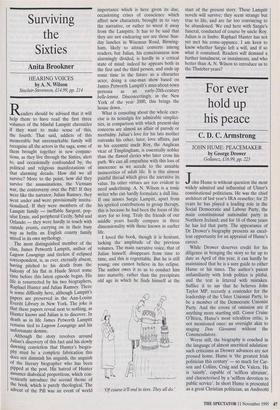Surviving the Sixties
Anita Brookner
HEARING VOICES by A. N. Wilson Sinclair-Stevenson, £14.99, pp. 214 Readers should be advised that it will help them to have read the first three volumes of the blissful Lampitt chronicles if they want to make sense of this, the fourth. That said, addicts of this memorable but unremarkable family will recognise all the actors in the saga, some of them brought together in new conjunc- tions, as they live through the Sixties, alert to, and occasionally confounded by, the political and religious manifestations of that alarming decade. How did we all survive? More to the point, how did they survive the assassinations, the Vietnam war, the controversy over the Pill? If they were like the narrator, Julian Ramsey, they went under and were provisionally institu- tionalised. If they were members of the Lampitt family — ineffable Sargent, pop- ulist Ernie, and peripheral Cecily, Sybil and Orlando — they were hardly in touch with outside events, carrying on in their busy way as befits an English county family mired in its own mythology.
The most distinguished member of the clan, James Petworth Lampitt, author of Lagoon Loungings and tireless if eclipsed correspondent, is, as ever, eternally absent, having pitched to his death from the balcony of his flat in Hinde Street some time before this latest episode began. His life is resurrected by his two biographers, Raphael Hunter and Julian Ramsey. There is some difficulty here, although Lampitt's papers are preserved in the Ann-Louise Everitt Library in New York. The joke is that these papers reveal next to nothing, as Hunter knows and Julian is to discover. In death as in life James Petworth Lampitt remains tied to Lagoon Loungings and his unfortunate demise.
Although the story revolves around Juhan's discovery of this fact and his slowly dawning conviction that Hunter's biogra- phy must be a complete fabrication this does not diminish his anguish, the anguish of the literary biographer who has been Pipped at the post. His hatred of Hunter assumes diabolical proportions, which con- veniently introduce the second theme of the book, which is purely theological. The advent of the Pill was an event of world importance which is here given its due, occasioning crises of conscience which affect new characters, brought in to vary the narrative, or rather to wrest it away from the Lampitts. It has to be said that they are not endearing nor are those Sun- day lunches in Wiseman Road, Birming- ham, likely to attract converts among readers, but Julian, his consciousness now alarmingly divided, is hardly in a critical state of mind: indeed he appears both in the first and the third person, and ends up some time in the future as a character actor, doing a one-man show based on James Petworth Lampitt's man-about-town persona as an early-20th-century belle-lettrist. Disconcertingly, in the New York of the year 2000, this brings the house down.
What is consoling about the whole exer- cise is its nostalgia for admirable simplici- ties, in comparison with which present-day concerns are almost an affair of parody or morbidity. Julian's love for his late mother outranks his other, later, love affairs, just as his eccentric uncle Roy, the Anglican vicar of Timplingham, is essentially nobler than the flawed clerics who later cross his path. We can all empathise with this loss of innocence as we accede to the amiable insincerities of adult life. It is this almost painful thread which gives the narrative its value. Its other virtues are too evident to need underlining. A. N. Wilson is a tonic writer who can hardly formulate a dull line. If one misses Sargie Lampitt, apart from his spirited contributions to group therapy, this is because he had been the focus of the story for so long. Truly the friends of our middle years hardly compare in three dimensionality with those known in earlier life.
I loved the book, though it is hesitant, lacking the amplitude of the previous volumes. The main narrative voice, that of Julian himself, disappears from time to time, and this is regrettable. But he is still young; one cannot believe in his eclipse. The author owes it to us to conduct him into maturity, rather than the precipitate old age in which he finds himself at the `Of course it'll end in tiers. They all do.' start of the present story. These Lampitt novels will survive; they seem strange but true to life, and are far too convincing to be abandoned. We end here with Sargie's funeral, conducted of course by uncle Roy. Julian is in limbo. Raphael Hunter has not yet met his come-uppance. I am keen to know whether Sargie left a will, and if so what it contained. Readers will demand a further instalment, or instalments, and who better than A. N. Wilson to introduce us to the Thatcher years?


















































































 Previous page
Previous page